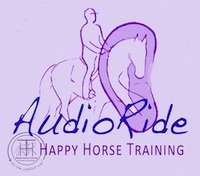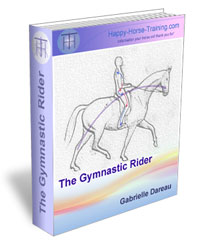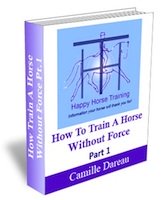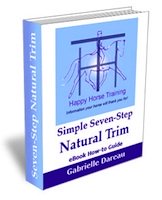|
Rider Health: Fitness and Healing
Whether horse-riding is defined as a Sport or as an Art, the physical and psychological fitness of the rider is just as important as in any other physical activity. Fitness is an important aspect of rider health and is basically the ease at which your body can accommodate itself to the task in hand. It follows then that the best training you can undergo to improve your riding, is riding itself. 
In terms of improving your cardiovascular fitness, the benefits of riding are limited in comparison with running or other pursuits which tend to favour the locomotive musculature. The postural fitness required for correct riding however, is considerable. Unfortunately it is not always possible for everyone to ride either often enough or in the optimum circumstances to bring their fitness up to the level where they can get the most out of the riding they can manage. 

Basically any activity which requires coordination, postural control and using the body evenly will help to improve riding ability - even sweeping the yard, especially if you change sides occasionally and concentrate on using the abdominal muscles and maintaining a good posture! Go to Pilates for Riders: The Postural Advantage for an example of how fitness and strength can greatly assist your riding, and look at The Psoas Muscle And Its Importance in Riding to find out about this particularly significant postural muscle. Rider health in general is important because if you are feeling good, you can concentrate better and your patience will be improved, as well as optimizing your physical effectiveness and strength. The importance of rider health goes much deeper than this however. Riding a horse is a little out of the ordinary in the sense that when it is done correctly, one being (the rider) is guiding and directing another being (the horse) uniquely as a result of an accomplished state of balance.


How to Heal Rider Health Problems It is in the nature of most Alternative Therapies to address the healing of the whole organism, therefore seeking the sources of problems rather than simply attempting to eliminate the symptoms. It is more valuable to think of symptoms as signs which have arisen in the body as a result of a process of dis-ease which is itself the result of a lack or an imbalance in the healthy processes of the body. For example stomach problems may be a result of the overproduction of acid, which is the result of a spinal lesion i.e muscles in spasm which are pressing on the nerves which regulate the biochemical composition in the stomach. Of course damage at any level will cause problems and reduce our functionality, but as most damage that is sustained by people as a result of birth trauma, accidents and overuse, influence primarily the mechanism. The most powerful treatment is to address the mechanism itself. 
Our personal experience covers a relatively narrow range of such therapies, probably because healing is natural, and we don't have to search too far for a means to access and support our innate healing powers. It is a case of finding whichever therapy you feel comfortable and inspired by, and remember that you cannot expect to make a finished sculpture in one session. Cranio-Sacral Therapy: 
Particularly powerful, because it connects the therapist directly with the central nervous system of the recipient. In our experience following the innate intelligence of the recipient and supporting whichever process it wishes to address is the most effective procedure. This is as opposed to imposing a regulation series of hand positions. The resolution of common rider health problems such as lower back stiffness and sacroiliac joint damage, can be remarkable. 
Often the body can be deficient in certain nutrients or suffer from malfunction of metabolic processes. The more nutritional support you can give your body the better. Of course different supplements have different target centers in the body. Following your intuition and the guidance you will have from whichever health issues come up is the best way to find what is right for you. Common rider health problems which can respond well nutritionally are lack of stamina or concentration and low energy levels in general, also joint weakness or pain. 
The skill, when it comes to homeopathy, is finding the right remedy and potency. For this reason it can be a good idea to seek out a professional for a more profound healing process. There are many simple remedies however which are ideal for more minor complaints, replacing the use of conventional drugs which are toxic to the system. Relevant pages on Happy Horse Training that may interest you: Return from Rider Health: Fitness and Healing to Happy Horse Training home |
New from HHT!
AudioRide is a series of exercises designed to listen to while you ride.
Audio descriptions guide you through each step of developing a balanced, dynamic connection with the horse through your position.
This truly innovative learning tool gives you a whole new way of being guided in your riding, in a calm, clear, step-by-step way.
Free Download! Introductory Exercise: Riding in the Now
Click here for full details
The Gymnastic Rider eBook
Now available exclusively from HHT! A unique, comprehensive guide to practical rider biomechanics. This professionally produced eBook takes the rider through the process of developing their body in the specific way that brings the horse's movement into harmony and balance - without force and constraint. Click here for full details, and to download the 15-page introduction for free.
Join the Happy Horse Training group on Facebook!
See and share topical info, news and photo's, and take part in lively discussions.
Click here to go to the HHT group and then click on the 'join group' button.
Join the Whole Horse Newsletter
HHT's free monthly newsletter giving you wide-ranging and intelligent insights into holistic horsemanship.
Just enter your details below to join.
Free bonus on the riding position with all new subscriptions: Ten Top Tips To Instantly Improve Your Connection With Your Horse.
Click here to see back issues of The Whole Horse newsletter
Train Your Horse
The Holistic Way
How To Train A Horse Without Force is a unique guide to training horses through energetic connection and gymnastic training. Part 1 covers everything on the ground, from handling to the lungeing technique that develops strength, straightness and engagement. Comes with a free eBook supplement on Horse Trauma.
Click here for more details.
What people say about the eBook:
"OMG! I'm BLOWN AWAY by this text [...] It's one of the best horse training texts I've ever read." - Wendy Kendall
"I realized that I haven't yet written you about the impact that your training e-book has had on me, and I want to let you know how inspiring and helpful I found it. As a student of Zen Buddhism for nearly three decades, I've often wondered when someone was going to write the book on Zen and the art of horsemanship, and I think that your emphasis on mindfulness and energy connection gets right at the heart of the matter. It has certainly deepened the way that I relate to and communicate with my horses. I am reasonably sensitive to horses' body language and mood, but new to me was the idea of feeling their energy in a more subtle way - including their connection with me even when I am not directly working with the them. I have made myself more aware of this communication, and it's pretty amazing. I have started grooming differently, too, treating a grooming session as a time to mindfully listen to my horse instead of a way to dust out an old rug (OK, I wasn't quite that bad, but you get the idea). Additionally, I have made myself more open to how I actually feel about the horses themselves - very enlightening. Overall, I think that you are saying something that no one else is saying but that everyone ought to hear." - Tess Lloyd
Do You Have
A Horse Story
To Share On HHT?
So many people have been through wonderful experiences with horses, whether in training or otherwise. If you've made a change in a horse's life - or one has made a change in yours - tell us about it here.
Learn How To Trim
Your Own Horse's Feet
The Simple Seven-Step Natural Trim is a comprehensive step-by-step guide to a cutting-edge barefoot trim. Click here to find out more.
What people say about HHT:
"The riding instruction is outstanding, if instructors in the UK taught this way there would be a lot of happy riders and horses."
"The riding tuition exceeded my hopes and expectations by a long way; giving me an exciting new facet to horsemanship which is lighter. more subtle, more elegant and more meaningful. It is as if a new door has opened bringing more sunlight and air."
"My goodness - what a change has taken place in my riding. I think that I'm starting to sit 'into' the horse rather than on top of him. I felt my horse's movements in a way that has almost never happened before"
Click on Testimonials for more






 Some of the other alternatives which can help us to become fit to ride are
Some of the other alternatives which can help us to become fit to ride are 

 In the case of Rider health, the concern is usually directly related to spinal or pelvic issues because riding is a postural exercise. The general Osteopathic concept is that healthy joints in the body will result in a healthy person. This includes vertebral joints. This concept makes sense because the musculo-skeletal system, which supports, protects and allows the body to function, is really the mechanism of our beings. The nervous system is more like the the control panel and the other organs can be seen as the battery which provides the energy. If the mechanism is performing well, this will generate health throughout the body.
In the case of Rider health, the concern is usually directly related to spinal or pelvic issues because riding is a postural exercise. The general Osteopathic concept is that healthy joints in the body will result in a healthy person. This includes vertebral joints. This concept makes sense because the musculo-skeletal system, which supports, protects and allows the body to function, is really the mechanism of our beings. The nervous system is more like the the control panel and the other organs can be seen as the battery which provides the energy. If the mechanism is performing well, this will generate health throughout the body. 



